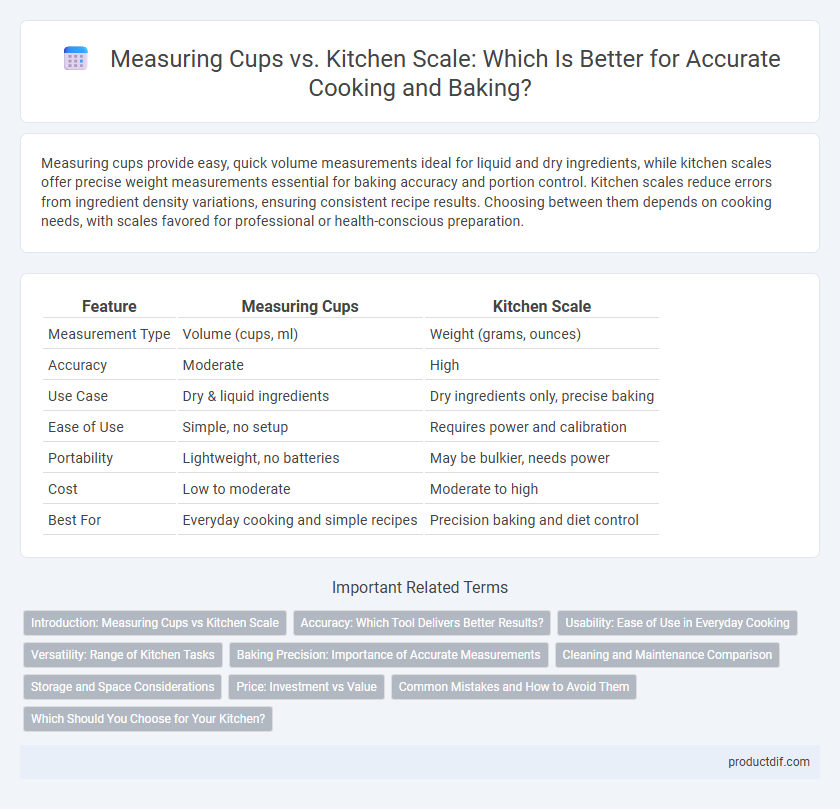Measuring cups provide easy, quick volume measurements ideal for liquid and dry ingredients, while kitchen scales offer precise weight measurements essential for baking accuracy and portion control. Kitchen scales reduce errors from ingredient density variations, ensuring consistent recipe results. Choosing between them depends on cooking needs, with scales favored for professional or health-conscious preparation.
Table of Comparison
| Feature | Measuring Cups | Kitchen Scale |
|---|---|---|
| Measurement Type | Volume (cups, ml) | Weight (grams, ounces) |
| Accuracy | Moderate | High |
| Use Case | Dry & liquid ingredients | Dry ingredients only, precise baking |
| Ease of Use | Simple, no setup | Requires power and calibration |
| Portability | Lightweight, no batteries | May be bulkier, needs power |
| Cost | Low to moderate | Moderate to high |
| Best For | Everyday cooking and simple recipes | Precision baking and diet control |
Introduction: Measuring Cups vs Kitchen Scale
Measuring cups provide volume measurements ideal for liquid and dry ingredients, offering convenience and speed in everyday cooking. A kitchen scale delivers precise weight measurements critical for accuracy in baking and portion control, ensuring consistent results. Choosing between measuring cups and a kitchen scale depends on the recipe requirements and the desired level of precision.
Accuracy: Which Tool Delivers Better Results?
A kitchen scale delivers superior accuracy compared to measuring cups by providing precise weight measurements, eliminating variations caused by ingredient density or packing. Measuring cups can produce inconsistent results due to differences in how ingredients are scooped or leveled, affecting recipe outcomes. For consistent baking and cooking, a kitchen scale ensures exact ingredient quantities, enhancing overall dish precision.
Usability: Ease of Use in Everyday Cooking
Measuring cups offer straightforward ease of use, allowing quick volume measurements for liquids and dry ingredients without the need for batteries or calibration. Kitchen scales provide precise weight measurements, improving accuracy in recipes that require exact ingredient amounts, particularly in baking. For everyday cooking, measuring cups excel in convenience, while kitchen scales enhance precision for complex recipes.
Versatility: Range of Kitchen Tasks
Measuring cups provide quick volume measurements for liquids and bulk ingredients, essential for baking and cooking recipes requiring precise cup or fluid ounce quantities. Kitchen scales offer superior versatility by accurately measuring ingredients by weight, including solids, liquids, and small amounts, enabling precise portion control and recipe consistency across various cuisines. Weighing ingredients with a kitchen scale helps reduce errors caused by ingredient density variations, making it indispensable for professional and home cooks seeking accuracy.
Baking Precision: Importance of Accurate Measurements
Measuring cups provide volume measurements that can vary based on ingredient texture and packing, potentially leading to inconsistencies in baking results. Kitchen scales offer precise weight measurements, ensuring exact ingredient quantities crucial for achieving perfect dough consistency and balanced flavors. Accurate measurements reduce the risk of recipe failures, making kitchen scales essential for bakers seeking reliable, repeatable outcomes.
Cleaning and Maintenance Comparison
Measuring cups, often made of plastic, glass, or stainless steel, are generally easier to clean with standard dishwashing methods and less prone to damage from water exposure. Kitchen scales, containing electronic components and sensors, require careful cleaning with a damp cloth to avoid moisture damage and maintain accuracy over time. Regular maintenance of scales includes battery replacement and calibration, while measuring cups need minimal upkeep beyond routine washing.
Storage and Space Considerations
Measuring cups offer compact storage options, often nesting together to save drawer space, making them ideal for small kitchens. Kitchen scales, although bulkier, provide multifunctional use and typically require dedicated counter or cabinet space. Choosing between the two depends on available storage and the need for precise weight measurements in cooking or baking.
Price: Investment vs Value
Measuring cups offer an affordable entry point, typically priced under $20, making them a budget-friendly choice for basic kitchen tasks. Kitchen scales, often ranging from $25 to $100, represent a higher initial investment but provide precise measurements essential for consistent baking and portion control. The added accuracy and versatility of a kitchen scale can deliver greater long-term value for serious cooks seeking precise ingredient tracking.
Common Mistakes and How to Avoid Them
Common mistakes when using measuring cups include inaccurate volume readings due to inconsistent packing or uneven surfaces, while kitchen scales often err from not zeroing the device properly or misplacing the container. Avoid these errors by leveling dry ingredients in measuring cups and using a tare function on scales for precise net weight measurements. Understanding the differences in precision between volumetric and weight-based tools ensures reliable and consistent results in cooking and baking.
Which Should You Choose for Your Kitchen?
Measuring cups provide quick volume measurements ideal for liquid and dry ingredients, while a kitchen scale offers precise weight measurements critical for baking and portion control. Choosing between measuring cups and a kitchen scale depends on the accuracy required and the types of recipes you frequently prepare. For consistent results and versatility, especially in baking, a digital kitchen scale is the superior tool.
Measuring Cups vs Kitchen Scale Infographic

 productdif.com
productdif.com